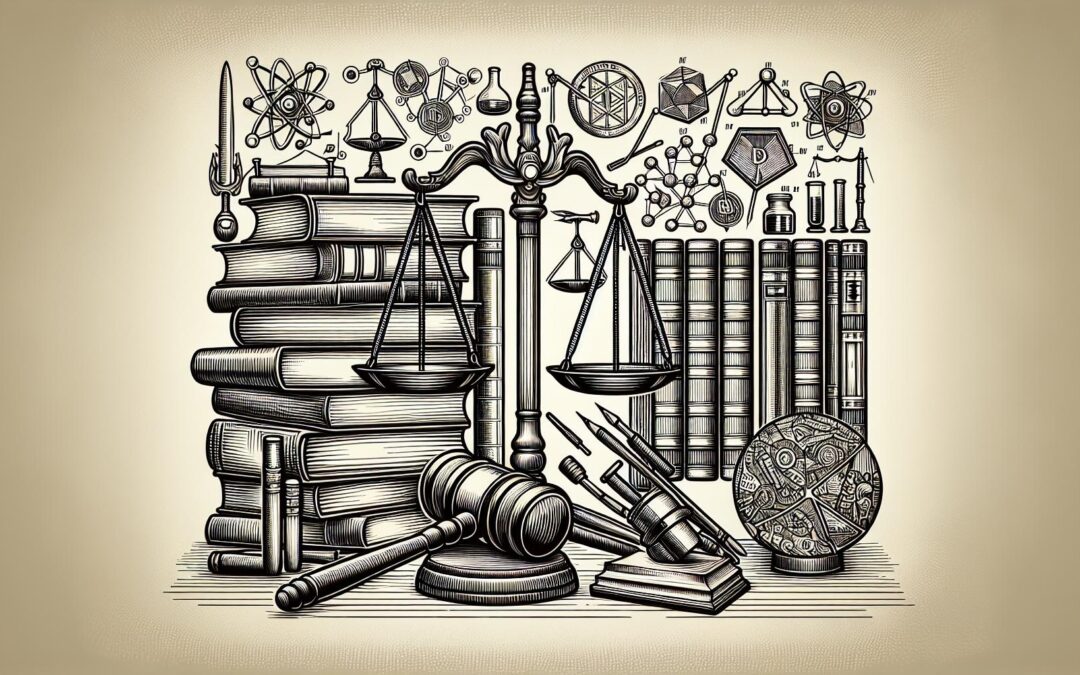The USPTO Patent Bar Exam is a crucial step for individuals seeking to become registered patent attorneys or agents. This exam measures a candidate’s knowledge of patent law and regulations and evaluates their ability to apply that knowledge in real-world scenarios. As it is a comprehensive and challenging exam, it requires intense concentration and focus in order to perform well.
Understanding the USPTO Patent Bar Exam
Before diving into the strategies to maintain concentration during the exam, it’s important to have a clear understanding of what the USPTO Patent Bar Exam entails.
The USPTO Patent Bar Exam is a computer-based exam that consists of multiple-choice questions, testing the candidate’s knowledge of patent laws and procedures as outlined by the United States Patent and Trademark Office (USPTO). It includes various topics, such as patentability requirements, patent prosecution, patent infringement, and patent searching. The exam consists of two main sections: the morning session and the afternoon session.
The morning session focuses on the “patent-related questions,” which assess the candidate’s understanding of the different laws and procedures. The afternoon session, on the other hand, includes “non-patent questions” that cover topics like ethics and USPTO rules and regulations.
What is the USPTO Patent Bar Exam?
The USPTO Patent Bar Exam is an examination administered by the USPTO to determine whether a candidate possesses the necessary knowledge and skills required to practice patent law before the USPTO.
Passing this exam is a crucial step in becoming a registered patent attorney or agent. It demonstrates that a candidate has a comprehensive understanding of patent laws, regulations, and procedures.
The exam is designed to test the candidate’s ability to apply legal principles in practical scenarios and make informed decisions. It covers a wide range of topics, including patentability requirements, patent prosecution, patent infringement, patent searching, ethics, and USPTO rules and regulations.
Successful completion of the USPTO Patent Bar Exam is a significant achievement and opens up opportunities for a career in patent law. It allows individuals to represent clients before the USPTO, draft patent applications, respond to office actions, and navigate the intricacies of the patent system.
Why is Concentration Important for the Exam?
Maintaining concentration during the USPTO Patent Bar Exam is vital for achieving success. The exam requires the ability to comprehend complex legal concepts, apply them in practical situations, and choose the correct answer from the multiple-choice options provided.
Distractions or a lack of focus can lead to misinterpretation of questions or mistakes in selecting the correct answers. Therefore, cultivating concentration skills is essential for maximizing performance and attaining a passing score.
During the exam, candidates must navigate through various scenarios and analyze different aspects of patent law. They need to stay focused and attentive to ensure accurate comprehension and interpretation of the questions.
Developing concentration skills involves strategies such as practicing mindfulness techniques, creating a conducive study environment, managing distractions, and employing effective time management. These techniques can help candidates maintain their focus and enhance their performance during the exam.
Furthermore, concentration is not only crucial during the exam itself but also during the preparation phase. Studying for the USPTO Patent Bar Exam requires extensive reading, understanding complex legal concepts, and memorizing key information. Concentration plays a vital role in absorbing and retaining the knowledge necessary to succeed in the exam.
By honing their concentration skills, candidates can approach the USPTO Patent Bar Exam with confidence, clarity, and the ability to tackle the challenging questions effectively.
Preparing for the Exam
Proper preparation is key to maintaining concentration during the USPTO Patent Bar Exam. By following these preparatory steps, you can help ensure that you are ready to tackle the exam with a focused mindset.
Before diving into the details of each step, it’s important to understand the significance of preparation. The USPTO Patent Bar Exam is a rigorous test that requires in-depth knowledge and understanding of patent law. It covers a wide range of topics, from patent prosecution to patent litigation, and it is essential to be well-prepared in order to succeed.
Creating a Study Schedule
A well-structured study schedule is essential for effective preparation. Breaking down the material into manageable sections helps prevent overwhelm and allows for focused study sessions. Allocate specific time slots for studying different topics and make sure to include regular breaks to rest and recharge.
When creating your study schedule, it’s important to consider the amount of time you have available before the exam. Ideally, you should start studying well in advance to allow for thorough coverage of all the topics. It’s also helpful to set realistic goals for each study session, so you can track your progress and stay motivated.
Additionally, consider your personal preferences when creating the study schedule. Some individuals find it easier to concentrate in the morning, while others may be more alert in the afternoon or evening. Tailor your schedule to your optimal study times for enhanced concentration.
Understanding the Exam Format
Familiarize yourself with the format and structure of the USPTO Patent Bar Exam. Knowing what to expect during the exam reduces anxiety and enhances concentration. Reviewing previous exam questions and sample tests can give you a sense of the types of questions you will encounter and the time constraints you will face.
It’s important to note that the USPTO Patent Bar Exam is a computer-based exam. This means that you will be using a computer to answer the questions and navigate through the exam interface. Familiarize yourself with the exam software, as well as the tools and features available, to ensure a smooth and efficient exam experience.
Mock exams can also be valuable tools for practicing your concentration skills under exam-like conditions. Time yourself as you answer questions to simulate the actual exam environment. This will help you get accustomed to the time constraints and train your mind to stay focused throughout the exam.
Useful Study Resources
Make use of resources that align with your learning style and preferences. There are various study materials available, including textbooks, online courses, practice exams, and study guides. Experiment with different resources to find what works best for you.
Textbooks are a traditional but reliable resource for studying patent law. They provide comprehensive coverage of the topics and can serve as a reference guide during your preparation. Online courses, on the other hand, offer a more interactive and engaging learning experience. They often include video lectures, quizzes, and assignments to help you grasp the concepts effectively.
Interactive online courses and study groups can provide a structured and collaborative learning experience, allowing you to discuss and clarify any doubts or questions you may have. This can be particularly helpful when studying complex topics or when you prefer a more interactive approach to learning.
Practice exams and question banks are invaluable resources for testing your knowledge and understanding. They allow you to gauge your progress, identify areas for improvement, and get familiar with the types of questions you may encounter in the actual exam. Make sure to review your answers and understand the reasoning behind the correct answers to further enhance your understanding.
In conclusion, proper preparation is crucial for maintaining concentration during the USPTO Patent Bar Exam. By creating a well-structured study schedule, understanding the exam format, and utilizing useful study resources, you can maximize your chances of success. Remember to stay focused, stay motivated, and believe in your ability to conquer the exam!
Techniques to Improve Concentration
While preparation is essential, knowing how to maintain concentration during the actual exam is equally important. Employing concentration-enhancing techniques can help you stay focused and perform optimally during the exam.
Mindfulness and Meditation
Mindfulness and meditation practices can significantly improve concentration and attention span. These techniques involve training the mind to focus on the present moment, clearing away distractions, and promoting a calm and focused state of mind.
Integrate short meditation sessions into your study routine to enhance your ability to concentrate. Find a quiet and comfortable space, close your eyes, and focus on your breath. With consistent practice, you will develop the ability to stay present and focused during the exam.
Effective Breaks and Time Management
A well-planned break schedule can help maintain your concentration throughout the exam. Incorporate short breaks between study sessions or test sections to rest your mind and recharge.
During your breaks, engage in activities that promote relaxation and mental clarity. Stretching exercises, going for a walk, or listening to soothing music can rejuvenate your mind and prevent mental fatigue.
Additionally, practicing good time management during the exam is crucial. Allocate time to each question based on its difficulty, and avoid spending excessive time on a single question. Sticking to the allocated time helps maintain a steady pace and prevents rushing towards the end of the exam.
Nutrition and Hydration for Focus
Proper nutrition and hydration play a vital role in sustaining focus and concentration. Avoid consuming heavy, greasy meals that can cause drowsiness during the exam. Instead, opt for light, easily digestible foods that provide sustained energy.
Stay hydrated by drinking water throughout the exam to prevent dehydration, which can negatively affect cognitive function. Keep a water bottle with you at all times and take regular sips to maintain optimal hydration levels.
Dealing with Exam Stress and Anxiety
Exam stress and anxiety can have a detrimental impact on concentration levels. Recognizing the signs of stress and knowing how to manage it is essential for maintaining focus during the USPTO Patent Bar Exam.
Recognizing Signs of Stress and Anxiety
Stress and anxiety can manifest themselves in various ways, such as racing thoughts, irritability, difficulty sleeping, or physical symptoms like headaches or stomachaches. Bpersonal knowledge of your stress responses can help you identify when you are becoming overwhelmed and take proactive steps to manage your anxiety.
Stress Management Techniques
Implement stress management techniques to mitigate the negative impact of exam-related stress on your concentration. Deep breathing exercises, progressive muscle relaxation, and positive self-talk are effective strategies to reduce stress levels and promote a calm mindset.
Engaging in regular physical exercise before the exam can also help mitigate stress by releasing endorphins and improving overall well-being. Whether it’s going for a jog, practicing yoga, or engaging in any physical activity you enjoy, fitting exercise into your preparation routine can enhance concentration and reduce anxiety.
Seeking Professional Help
If exam-related stress and anxiety become overwhelming and significantly hinder your ability to concentrate, consider seeking professional help. Talking to a therapist or counselor can provide valuable strategies and support tailored specifically to your needs.
A professional can help you develop personalized coping mechanisms and provide guidance on managing exam-related stress. They can equip you with the necessary tools to maintain concentration and perform at your best during the USPTO Patent Bar Exam.
By understanding the USPTO Patent Bar Exam, properly preparing, and utilizing effective concentration techniques, you can give yourself the best chance of success. Maintaining focus and concentration during the exam ensures that you can showcase your knowledge and abilities to their fullest potential. Remember to stay calm, stay focused, and trust in your preparation. Good luck!











